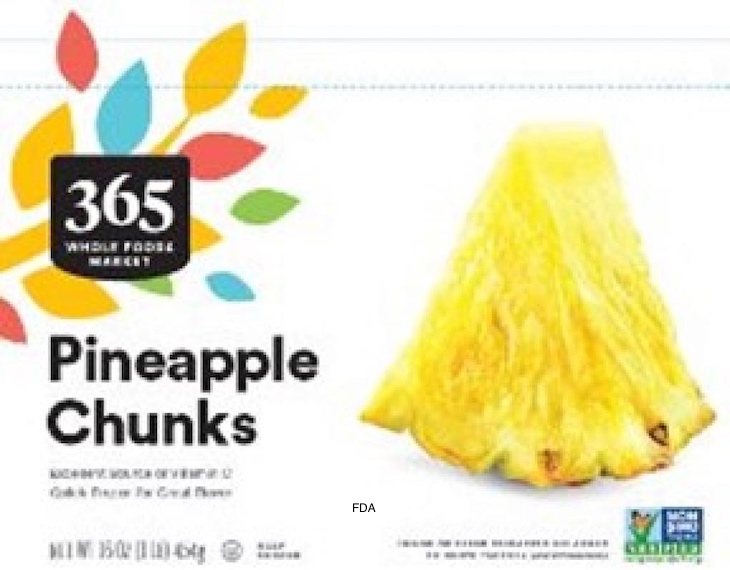A huge frozen fruit recall for possible Listeria monocytogenes contamination has been issued by SunOpta Inc. The contamination is linked to pineapple provided by a third party supplier. No illnesses have been reported to the company to date in connection with the consumption of these products. The voluntary recall has been issued by SunOpta’s subsidiary, Sunrise Growers, in Minneapolis, Minnesota.

The huge frozen fruit recall includes Great Value Mixed fruit, Great Value Dark Sweet Cherries, and Great Value Mango Chunks sold at Walmart stores located in Arkansas, Arizona, California, Colorado, Washington DC, Iowa, Idaho, Illinois, Indiana, Kansas, Kentucky, Louisiana, Maryland, Minnesota, Missouri, Montana, North Dakota, Nebraska, New Mexico, Nevada, Ohio, Oklahoma, Oregon, Pennsylvania, South Dakota, Texas, Utah, Virginia, West Virginia and Wyoming from January 19, 2023 to June 13, 2023
Also recalled is 365 Organic Tropical Fruit Medley, 365 Organic Pineapple Chunks, 365 Pineapple Chunks, 365 Organic Whole Strawberries, 365 Organic Slice Strawberries and Bananas, and 365 Organic Blackberries sold at Whole Foods stores that were distributed to select stores throughout the U.S. from November 1, 2022 to June 21, 2023
Trader Joe’s Organic Tropical Fruit Blend is included in this recall. It was distributed to select distribution centers or stores in Alaska, Alabama, Connecticut, Colorado, Delaware, Iowa, Illinois, Indiana, Kansas, Kentucky, Louisiana, Massachusetts, Maryland, Maine, Michigan, Minnesota, Missouri, Nebraska, New Hampshire, New Jersey, New Mexico, New York, Ohio, Oklahoma, Pennsylvania, Rhode Island, Tennessee, Texas, Virginia, Vermont, Wisconsin, and Washington D.C. from March 28, 2023 to April 11, 2023
Good & Gather Organic Cherries and Berries Fruit Blend, Good & Gather Dark Sweet Whole Pitted Cherries, Good & Gather Mango Strawberry Blend, Good & Gather Mixed Fruit Blend, Good & Gather Mango Chunks, Good & Gather Blueberries, and Good & Gather Triple Berry Blend are also recalled. They were sold at Target stores nationwide from October 14, 2022 to May 22, 2023
Season’s Choice Tropical Blend sold at Aldi stores was distributed to select distribution centers or stores in Alabama, Arkansas, Connecticut, Florida, Georgia, Iowa, Kansas, Kentucky, Massachusetts, Maryland, Michigan, Missouri, Mississippi, North Carolina, Nebraska, New Hampshire, New York, Ohio, Oklahoma, Pennsylvania, Rhode Island, South Carolina, Tennessee, Texas, Virginia, Vermont, and West Virginia from October 11, 2022 to May 22, 2023
Finally, Best Choice Pitted Red Tart Cherries Unsweetened sold at AWG (Associated Wholesale Grocers) stores were distributed to select distribution centers or stores in Kansas, Missouri, Nebraska, and Oklahoma from April 5, 2023 to May 4, 2023.
You can see the huge list of lot numbers and best by dates, along with package sizes, at the FDA web site, along with product photos. Please check your freezers to see if you purchased any of three products. If you did, throw them away and do not eat them, even if you plan to cook them first. You can also take these products back to the place of purchase for a refund.





Two questions. If this was related to pineapple, why are products containing no pineapple being recalled? And doesn’t it seem unusual to have an outbreak of L. mono in pineapple that has a pH of 3.4-4 when Listeria can’t grow under pH 4.4? Something doesn’t make sense here.
Because there is zero tolerance for Listeria monocytogenes contamination in ready to eat foods, and because the pathogen causes serious illness and death, recalls are issued when the pathogen is found in a product. Foods produced on the same line are often recalled too, out of an abundance of caution. Listeria monocytogenes can grow at a pH as low as 4.0 (https://www.foodstandards.gov.au/publications/Documents/Listeria%20monocytogenes.pdf), while the pH of pineapple can range from 3.2 to 4.1. So there is some overlap.